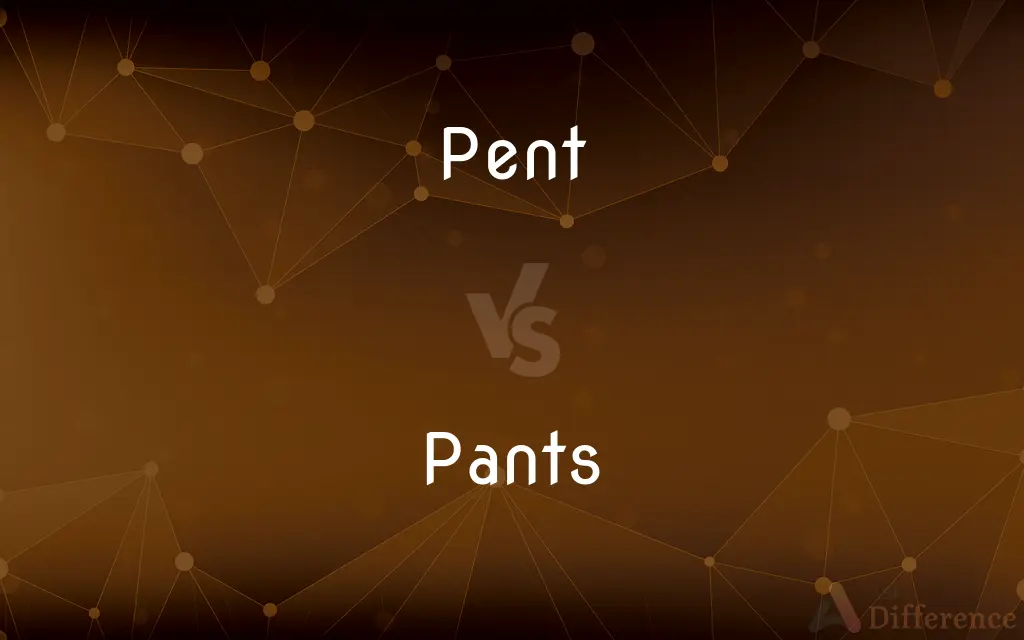Pent vs. Pants — What's the Difference?
By Tayyaba Rehman — Updated on December 22, 2023
"Pent" is a past tense form of "pen," meaning confined or restricted, while "pants" refers to a garment covering the body from the waist to the ankles, with a separate part for each leg.

Difference Between Pent and Pants
Table of Contents
ADVERTISEMENT
Key Differences
Pent is primarily used as a verb form, indicating a state of being confined or trapped, often conveying a sense of restriction or limitation. In contrast, pants are a common clothing item, designed to cover the lower part of the body, usually extending from the waist to the ankles, and featuring two separate leg openings.
The usage of pent typically relates to emotions or physical states being constrained, as in feelings being pent up. On the other hand, pants refer to a practical item of clothing, often made of fabric like denim, cotton, or polyester, and are a staple in most wardrobes for their functionality and comfort.
While pent can also appear in compound words like "pent-up" to describe repressed emotions or energy, pants is a versatile term that can vary in meaning based on context, including being a verb meaning to breathe heavily or gasp for air, particularly after exertion.
The word pent carries a more abstract and metaphorical connotation, often used in literature and poetry to describe a state of emotional or physical confinement. In contrast, pants are a tangible, everyday item, with variations like trousers, jeans, leggings, and sweatpants, reflecting different styles and uses.
In terms of language evolution, pent is less commonly used in modern English and is often found in more formal or literary contexts. Pants, however, is a widely used term, constantly evolving with fashion trends and cultural changes, and is recognized globally, albeit with regional variations in terminology (such as "trousers" in British English).
ADVERTISEMENT
Comparison Chart
Part of Speech
Verb (past tense of "pen")
Noun
Meaning
Confined or restricted
Garment for lower body
Usage Context
Emotional, physical state
Clothing, fashion
Connotation
Metaphorical, abstract
Practical, tangible
Variations
Less varied, often "pent-up"
Many (trousers, jeans, leggings)
Compare with Definitions
Pent
Pent is the past tense of "pen," meaning to confine or enclose.
The animals were pent in a small enclosure.
Pants
As a verb, "pants" means to breathe heavily or quickly.
After the long run, she was panting with exhaustion.
Pent
Pent is often used to convey a sense of containment or restriction in a specific area.
The floodwater was pent behind the dam.
Pants
Trousers
Corduroy pants
Wide pant legs
Pent
In literary use, pent can depict a state of being trapped or limited.
She felt pent in the small, claustrophobic room.
Pants
In American English, "pants" often specifically refers to outer garments like jeans or slacks.
Her new jeans were the most comfortable pants she'd ever owned.
Pent
Pent can describe feelings or energy that are restrained or not expressed.
His frustration was pent up until he finally exploded in anger.
Pants
Underpants or knickers.
Pent
Penned or shut up; closely confined.
Pants
Rubbish; nonsense
He thought we were going to be absolute pants
Pent
Confinement; concealment.
Pants
To breathe rapidly in short gasps, as after exertion.
Pent
A pentatonic scale.
Pants
To beat loudly or heavily; throb or pulsate.
Pent
A pentacle or pentagram.
Pants
To give off loud puffs, especially while moving.
Pent
Confined in, or as if in, a pen; imprisoned.
Pants
To long demonstratively; yearn
Was panting for a chance to play.
Pent
(archaic) pen; penned
Pants
To utter hurriedly or breathlessly
I panted my congratulations to the winner of the race.
Pent
Penned or shut up; confined; - often with up.
Here in the body pent.
No pent-up Utica contracts your powers.
Pants
A short labored breath; a gasp.
Pent
Closely confined
Pants
A throb; a pulsation.
Pent
Pent, in a broader sense, can imply a state of being held back or confined by circumstances.
He lived a pent life, never venturing beyond his hometown.
Pants
A short loud puff, as of steam from an engine.
Pants
An outer garment that covers the body below the waist, usually to the ankles, and is divided into sections to fit each leg separately
She decided to wear pants instead of a skirt. He bought a new pair of pants.
Pants
Underpants.
Pants
An outer garment that covers the body from the waist downwards, covering each leg separately, usually as far as the ankles; trousers.
Pants
An undergarment that covers the genitals and often the buttocks and the neighbouring parts of the body; underpants.
Pants
Rubbish; something worthless.
You're talking pants!
The film was a load [or pile] of pants.
Pants
Of inferior quality, rubbish.
Your mobile is pants — why don’t you get one like mine?
Pants
A garment extending from the waist to the knee or ankle, covering each leg separately.
Pants
Underpants.
Pants
Underpants worn by women; panties.
Pants
(usually in the plural) a garment extending from the waist to the knee or ankle, covering each leg separately;
He had a sharp crease in his trousers
Pants
(usually in the plural) underpants worn by women;
She was afraid that her bloomers might have been showing
Pants
Pants are a garment covering the body from the waist to the ankles, with separate parts for each leg.
He chose a pair of black pants for the formal event.
Pants
Pants can also refer to undergarments in British English.
She hung the freshly washed pants on the line.
Pants
Pants can denote various styles and types of legwear, including trousers, jeans, and leggings.
He preferred wearing loose pants for yoga classes.
Common Curiosities
Is "pent" still commonly used in modern English?
"Pent" is less common and often found in literary or formal contexts.
Is "pent-up" always negative?
"Pent-up" often has a negative connotation, implying a harmful buildup of emotions or energy.
Do pants always have two legs?
Yes, traditional pants have two separate openings for each leg.
Is "pent" used metaphorically?
Often, "pent" is used metaphorically to describe emotions or situations.
Do pants vary culturally?
Yes, styles and types of pants vary widely across different cultures.
Are pants gender-specific?
Pants are worn by all genders, with varying styles for each.
Is "pent" a standalone word or used in phrases?
It's often used in phrases like "pent-up."
Can "pent" be used in various tenses?
"Pent" is primarily the past tense; other forms use "pen" (e.g., penning).
Are pants and trousers the same?
Yes, "pants" in American English is synonymous with "trousers" in British English.
Are pants considered casual wear?
Pants can be both casual and formal, depending on the style and fabric.
Are jeans a type of pants?
Yes, jeans are a popular style of pants.
How do fashion trends affect pants?
Fashion trends greatly influence the styles, cuts, and fabrics of pants.
Does "pent" have different meanings in different contexts?
Its core meaning of confinement remains, but context can add nuances.
Can "pent" refer to physical space?
Yes, it can describe being confined in a physical area.
Can "pent" describe a temporary state?
Yes, it can describe a temporary state of confinement or restriction.
Share Your Discovery

Previous Comparison
Chute vs. Gutter
Next Comparison
Chalupa vs. ChimichangaAuthor Spotlight
Written by
Tayyaba RehmanTayyaba Rehman is a distinguished writer, currently serving as a primary contributor to askdifference.com. As a researcher in semantics and etymology, Tayyaba's passion for the complexity of languages and their distinctions has found a perfect home on the platform. Tayyaba delves into the intricacies of language, distinguishing between commonly confused words and phrases, thereby providing clarity for readers worldwide.














































